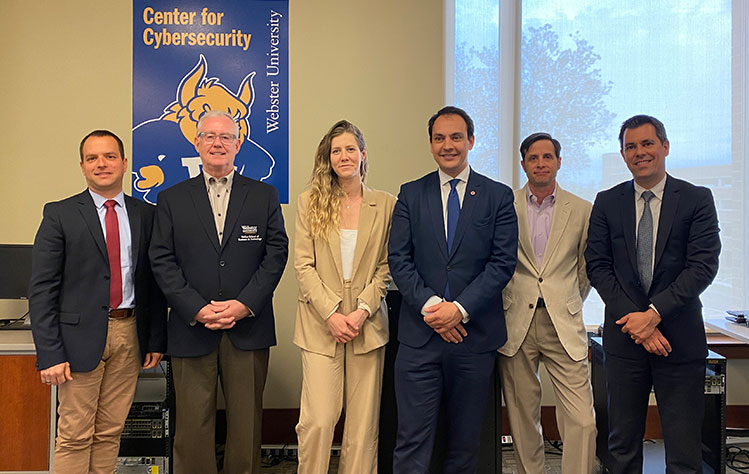Webster Cybersecurity Faculty Hosts World Affairs Council
June 09, 2023

On May 11, the cybersecurity faculty of Webster University hosted the World Affairs Council group from France and Monaco as part of the U.S. State Department Strengthening Cyber Resilience International Visitor Leadership Program.
During the two-hour visit, Webster faculty and the World Affairs Council group discussed the American cybersecurity concept, academic programs, partnerships with industry, the St. Louis system of cooperation between the Gateway to Higher Education Cybersecurity Consortium universities and colleges, the Global Cybersecurity Center and the non-profit CyberUp.
James Curtis, chair of Webster’s Computer and Information Sciences Department, spoke to the importance of global teamwork when it comes to cybersecurity.
“Cybersecurity is an increasingly global challenge to the safety of all people, and one that does not recognize nation-state boundaries,” Curtis explained. “When we come together and share our ideas, educational programs and how we partner with government and industry to protect our national assets, we are able to learn from each other and mutually enhance our ability to protect the international community.”
“This visit underscores that the cybersecurity talent gap is a worldwide issue,” said Jason Dill, instructor of cybersecurity at Webster. “We appreciate that the World Affairs Council chose Webster University to see how we are preparing students to address this need. The exchange of ideas and viewpoints about cybersecurity education was a benefit to all participants.”
Meeting attendees included Francois Flahaut, Chief of Staff and Cabinet Director, Manche Prefect and Sub-Prefect; James Curtis; Marie Fredet, Legal Administrator, Government of Monaco; Pierre Oliver Mayor, Second Arrondissement of Lyon; Jason Dill; and Laurent Benoit Rossier, Senior Cyber Security Engineer, National Computer Emergency Response Team, Monegasque Digital Security Agency.
The cybersecurity faculty and World Affairs Council group plan to continue dialogue and exchange ideas going forward.
